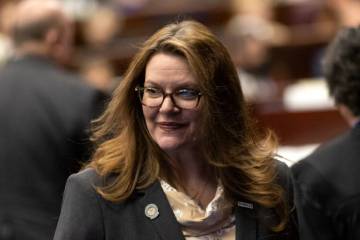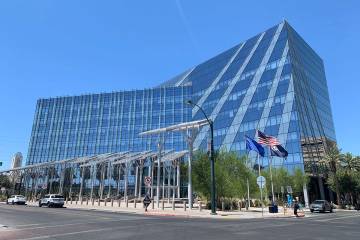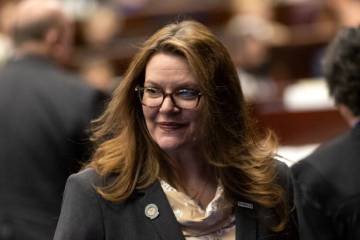Hollywood developers, studio pitch Nevada’s film tax credit plan
CARSON CITY — Lawmakers had their first chance to consider a bill that would create an estimated $4.6 billion in film tax credits over the next 20 years, hearing more than three hours of testimony on the expansive bill Tuesday afternoon.
Senators on the Revenue and Economic Development Committee had the chance to ask the bill’s sponsor, state Sen. Roberta Lange, D-Las Vegas, and key supporters about the inner workings of Senate Bill 469, a bill which would make $190 million in film tax credits available every year for the next 20 years.
Lange was joined by representatives from Birtcher Development, Sony Pictures Entertainment and Howard Hughes Corporation, architects of the bill who have vowed to build two separate film production campuses in the Las Vegas area as part of the film tax credit deal.
“It’s really Nevada’s moment in time to finally enter this sector, putting Las Vegas strongly in the position of the entertainment capital of the world,” said Birtcher CEO Brandon Birtcher.
A majority of the transferable credits will be available for companies that produce content at those two campuses, including the proposed Las Vegas Media Campus Project, managed and partly financed by Birtcher. The other proposed campus, set to be built in Summerlin, will be managed by Sony and Howard Hughes.
Howard Hughes Corporation CEO David R. O’Reilly said the company was willing to commit $700 million toward the project.
The program will end 20 years after the first production at the Las Vegas Media Campus project receives tax credits. Tax credits given out during that time span could reach as much as $4.8 billion between the program in the proposed legislation and the state’s existing film tax credit program, according to an analysis by the Legislative Counsel Bureau.
But despite the massive price tag, the bill drew support from several groups, cities and unions from across the state, who said the bill could bring jobs to the state and diversify its economy. Supporters included the AFL-CIO, the Las Vegas Raiders, the cities of Las Vegas and Henderson, the Las Vegas Chamber of Commerce and the Nevada System of Higher Education, among several others.
“As we continue to rebuild our economy after the pandemic, it is essential that we strengthen our workforce by creating new jobs throughout our industries,” said Nevada State AFL-CIO Secretary Treasurer Susie Martinez. “We have a unique opportunity to fundamentally change and promote economic development opportunities through Senate Bill 496.”
But four groups spoke against the bill, including the Progressive Leadership Alliance of Nevada, Battle Born Progress, the Nevada Republican Party and the Nevada Policy Research Institute.
“We are not opposed to business or diversifying our economy,” Battle Born Progress Executive Director Annette Magnus said. “We agree with jobs coming here, especially for our union families. What we are opposed to is yet another handout to a multimillion dollar company when those investments could go to our schools, our health care system, affordable housing, infrastructure, mental health or literally anything else that are critical needs for Nevadans.”
Lawmakers are also considering an amendment that would create a carve-out for independent filmmakers, who don’t usually produce their content at major studios.
Contact Taylor R. Avery at TAvery@reviewjournal.com. Follow @travery98 on Twitter.





























